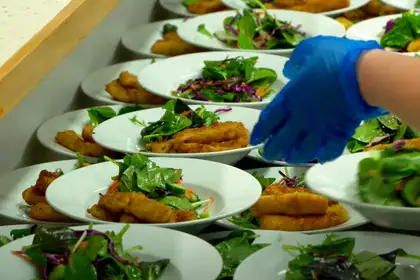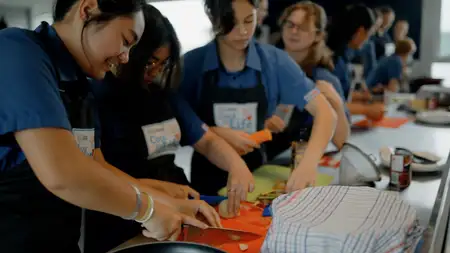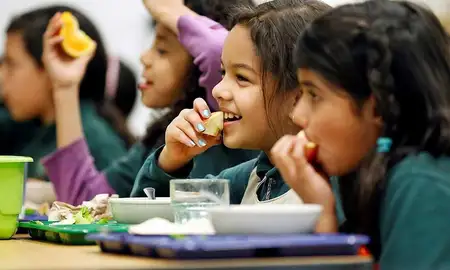
Some of the lunches served at Dannevirke High School under the Ka Ora Ka Aka programme.
Research from the School of Health Sciences at Te Kunenga ki Pūrehuroa Massey University has found that the implementation of Ka Ora Ka Ako at Dannevirke High School from 2021 has led to improved student outcomes and reduced food insecurity, as well as enhanced learning, behaviour and engagement. The programme has also seen stronger relationships formed between students and staff.
Research team member Associate Professor Chrissy Severinsen says, “The Dannevirke High School model shows that when thoughtfully-planned, school meal programmes create environments that enable students to thrive.”
The school opted to leverage an old hostel building to develop a commercial kitchen and refresh the dining hall rather than outsourcing meals. Students and staff eat together in the wharekai each day.
Research team member Dr Angelique Reweti, Ngāpuhi, says, “The wharekai has strengthened bonds between students and staff, while tackling issues like hunger and other barriers to learning. It has become a cornerstone of the school culture.”
She adds that beyond addressing hunger, teachers have reported that the programme has improved student concentration, behaviour and engagement, as well as stronger student-teacher and student-student relationships. There have also been other noticeable benefits, such as reduced waste from pre-packaged meals and a cleaner school environment.
Dr Reweti says the Dannevirke High School example is a powerful reminder of what Ka Ora Ka Ako can do.
“It’s not only mitigating hunger, but also enriching the educational experience for students. By fostering a sense of community and belonging, improving engagement and enhancing academic performance, the programme demonstrates the vital link between student wellbeing and educational achievement.”
The research team are concerned that discontinuing Ka Ora Ka Ako could risk reversing the dramatic gains in learning, behaviour, culture and wellbeing that have been seen at schools like Dannevirke High School.
They are urging policymakers to consider the research before making decisions that could detrimentally impact communities.
Research team member Associate Professor Bevan Erueti, Taranaki, Te Atihaunui-a-Pāpārangi, Ngāti Tūwharetoa,says, “We welcome discussions on improving implementation, but if we were to lose the programme, we risk losing substantial benefits to culture, health and education.”
Dannevirke High School Principal Di Carter shares these concerns.
“Please do not let this go away, It’s too good. It’s for our students, for their learning. We need it.”
Teacher Logan Augustine echoed the sentiment.
“Overall, it’s a huge benefit for our students’ hauora. It’s one small step to getting our students to school, getting them learning, getting them involved in sport. A lot of good comes from the wharekai.”
Related news
Serving up nutritional education to help communities in need
Student dietitians are working closely with schools in South Auckland to teach young adults about nutrition, cooking and healthy eating.

HRC funds study of mātauranga Māori (traditional knowledge) of nutrition-related wellbeing
Dr Nikki Renall, Taranaki, has been awarded a Māori Health Research Postdoctoral Fellowship grant from the Health Research Council of New Zealand.

Massey offers expert advice on healthy school lunches
The Eat Right, Be Bright campaign have turned to Human Nutrition and Dietetics staff and students for advice about the best types of food for children to improve their dietary intake while at school.
